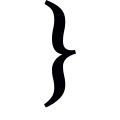Unsupported titles/`rcub`
 | ||||||||
| ||||||||
| ||||||||
| ||||||||
Translingual
Punctuation mark
}
- Used to add a comment to the right of and encompassing one or more lines, or to indicate that items to the left are subdivisions of the item on the right. Compare {.
- A ⎫
- B ⎬ these are a few letters of the alphabet
- C ⎭
- Joseph Emerson Worcester, A Dictionary of the English Language, volume 1:
- † AT'TRY, ⎫ a. [A.S. atter, poison.] Poison-
- † AT'TER-LY, ⎭ ous; virulent. Chaucer.
- Used to indicate that two or three lines of a poem form a doublet or triplet.
- Used in { }.
Usage notes
This symbol is also called a "right brace".
Related terms
References
- Thomas F. Adams, Typographia; Or, The Printer's Instructor: A Brief Sketch: Braces stand before, and keep together, such articles as are of the same import, and are sub-divisions of the preceding articles. They sometimes stand after, and keep together, such articles as make above one line, and have [...] posts after them, which are justified to answer to the middle of the brace. The bracing side of a brace is always turned to that part of an article which makes the most lines.
This article is issued from Wiktionary. The text is licensed under Creative Commons - Attribution - Sharealike. Additional terms may apply for the media files.